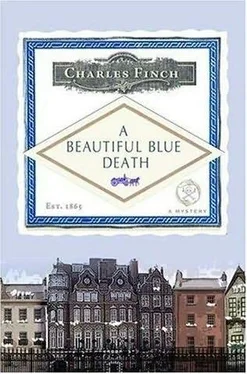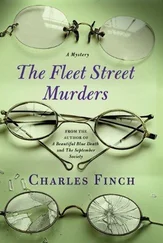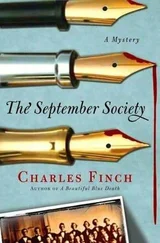Charles Finch - Beautiful blue death
Здесь есть возможность читать онлайн «Charles Finch - Beautiful blue death» весь текст электронной книги совершенно бесплатно (целиком полную версию без сокращений). В некоторых случаях можно слушать аудио, скачать через торрент в формате fb2 и присутствует краткое содержание. Жанр: Исторический детектив, на английском языке. Описание произведения, (предисловие) а так же отзывы посетителей доступны на портале библиотеки ЛибКат.
- Название:Beautiful blue death
- Автор:
- Жанр:
- Год:неизвестен
- ISBN:нет данных
- Рейтинг книги:5 / 5. Голосов: 1
-
Избранное:Добавить в избранное
- Отзывы:
-
Ваша оценка:
- 100
- 1
- 2
- 3
- 4
- 5
Beautiful blue death: краткое содержание, описание и аннотация
Предлагаем к чтению аннотацию, описание, краткое содержание или предисловие (зависит от того, что написал сам автор книги «Beautiful blue death»). Если вы не нашли необходимую информацию о книге — напишите в комментариях, мы постараемся отыскать её.
Beautiful blue death — читать онлайн бесплатно полную книгу (весь текст) целиком
Ниже представлен текст книги, разбитый по страницам. Система сохранения места последней прочитанной страницы, позволяет с удобством читать онлайн бесплатно книгу «Beautiful blue death», без необходимости каждый раз заново искать на чём Вы остановились. Поставьте закладку, и сможете в любой момент перейти на страницу, на которой закончили чтение.
Интервал:
Закладка:
What did the room say about the victim? Either that she was most fastidious or that she had few possessions-more likely the latter. She was not without some personal sense of taste, however. A picture of Hyde Park was tacked above her bed, which perhaps she had bought on her half day or received from a beau. And Lenox saw, as he opened the drawers of her bureau with his handkerchief, that she maintained her clothes as well as she could. Beyond personal taste, he thought, perhaps she took some pride in herself.
Thomas and Jenkins were both standing in the doorway, and even when Lenox went to the far left corner of the room, they only peered in slightly more intently.
“Big enough for a thin man,” said Jenkins, and Lenox nodded without turning.
He was referring to the medium-sized window that Lenox was inspecting, which looked out at a view of the feet walking by on the street, in an almost direct path to the wheels of his own carriage. It was, as Jenkins said, big enough to admit a man or, just as likely, to let a woman out. It was flung open. And on such a cold day.
“Probably too trampled outside to show anything. Scuff marks on the windowsill, which we should bear in mind. Don’t know why they’re there. It’s slick and so is the floor under it, but they probably would be anyway, just from the melting snow. Jenkins,” Lenox said, “have any of the servants been in here?”
“No,” the young inspector said. “Mr. Barnard posted the housekeeper at the door as soon as the body was discovered. And apparently the housekeeper is something of an iron maiden.”
“Do you know what an iron maiden is, sir?” Thomas asked.
Jenkins blushed and didn’t answer; he addressed Lenox. “None of the servants, no, sir.”
“And did Mr. Barnard tell you if he himself touched anything?”
“He said he hadn’t. Only picked up the note, there, on the desk.”
“I see,” said Lenox.
The open window puzzled him, but no doubt it would all come clear. He stepped back into the center of the room and got on his hands and knees. There was nothing on the floors-not even dust, to speak of-under the desk or the bureau, or under the small table, or in plain sight. Except for one thing. In the middle of the room, on the floor just next to the desk, were three or four drops of something. He scratched at one with his fingernail: wax.
He thought about this for a moment, filed it away, and then thoroughly examined the space under the bed, trailing his fingers along the underside of the mattress and shining a candle against every dark corner.
So! he thought. We have only the desk and the body. He stood up and walked toward the desk.
It was a thin piece of deal, without drawers but with sturdy legs. On top of it were an empty glass, with the stain of some drink on its lip; a new candle, which had never been lighted; a small brown unmarked bottle made of glass, with a rubber stopper; and a smooth piece of paper, the suicide note.
“A suicide, on the face of it,” said Jenkins.
Lenox thought for a moment. He would mention what he had seen (or rather, seen the absence of) in a few moments. He wanted to be unencumbered by Jenkins’s awe or embarrassment (who could predict which) while he looked at the desk.
“Indeed,” he muttered. “Indeed…”
He leaned over the desk on his fists and read the note.
It is too much. Sorry, James, I am sorry.
The note was unsigned.
“Is James her fiance?” Lenox said.
“Yes.”
“He’s in service here?”
“Yes.”
Lenox thought for a moment and nodded. He would take the glass and the bottle home to examine.
But before anything else, he thought wearily, it was time to disillusion the young detective.
“Jenkins,” he said, “you think this is a suicide?”
“It seems clear enough, sir.”
“I need you to fetch James for us. But don’t bring him into this room. Find a table somewhere.”
“Yes, sir.”
“And Jenkins-had it occurred to you that there should be a pen on this desk? Something that crossed my mind.”
The inspector frowned. “A pen?” he said.
“To write the note.”
“Perhaps it’s in a pocket?”
“Maids’ uniforms don’t have pockets, a relic of the time when their omission was thought to make stealing more difficult.”
Jenkins looked at the body. “And nowhere in the room?”
“No,” said Lenox, trying to make his voice kind.
“But she could easily have carried the note around with her.”
“I don’t think so,” Lenox said. “If you look at it, the paper is uncreased and unwrinkled.”
Jenkins stared at the desk. “Well, perhaps she took the pen and then replaced it,” he said.
“In the grip of suicide? Unlikely. There’s a chance, but I’d lay odds that we find it’s a murder. Someone wrote this with their own pen and left it here. Notice the small squiggly letters-probably somebody trying to hide their handwriting. Forger’s tremor.”
Jenkins sighed. “Yes, you’re right, I imagine.” Then he looked up and said, “I’ll find the fiance.”
Lenox nodded. Then, thinking, he looked at the desk and the doorway until he was satisfied and turned to the bed.
“Thomas,” he said. “The body.”
Chapter 4
Thomas McConnell had moved to London from Scotland, where he had grown up, shortly after the conclusion of his formal medical education. He was a doctor. He opened a practice on Harley Street within six months of his arrival, advertised as a specialist in surgery, and set about making his name. This he had done quickly and impressively; he was open to new techniques, and his skill with a scalpel was surpassing. By the time he was thirty, he had one of the leading practices in all of London.
And then, when he was thirty-one, he married. More specifically, he married up-to Lady Victoria Phillips, who was nineteen at the time. McConnell was handsome, had a fair amount of money, and came from a good family. But in each of these respects, the civilized world agreed, he was infinitely inferior to Toto Phillips, who had beauty, fortune, and a name by any standard you cared to choose.
She married Thomas McConnell in the year she came out, because, her friends knew, he was different from the men of her milieu and generation. Those men had been her friends from birth, and they would always be her friends. But she could never have married any of them. Thomas was manlier, less dandy, less corrupted by money, and he had ideas: about books, about plays, about the cities of the Continent, about beauty, about her beauty, about her. Their wedding was a celebrated one, because while he had married up, he hadn’t married so far up as to disqualify him from benefit. The Prime Minister-Toto’s father’s friend from public school-had come, along with half of Debrett’s.
For the first three years, Thomas and Toto were happy. It was during this time that Lenox first met McConnell. Lady Jane was, after a fashion, Toto’s mentor-they were first cousins but treated each other as aunt and niece, Toto’s mother having succumbed to a fever when her daughter was only eleven. So Lenox was thrown together with the young couple a good deal. Thomas had reduced his practice, and he and his wife went out most evenings and traveled widely together. He accepted with goodwill her social schedule, and she accepted with equal goodwill their yearly visits to his family in Scotland.
But the first three years had ended, and the halcyon days of their marriage had ended with them. Thomas had all but abandoned his practice by then, and he began to drink too much. Toto had taken to spending six months of the year at Longwell, her father’s estate in Kent, just outside of London, while her husband remained in the city.
Читать дальшеИнтервал:
Закладка:
Похожие книги на «Beautiful blue death»
Представляем Вашему вниманию похожие книги на «Beautiful blue death» списком для выбора. Мы отобрали схожую по названию и смыслу литературу в надежде предоставить читателям больше вариантов отыскать новые, интересные, ещё непрочитанные произведения.
Обсуждение, отзывы о книге «Beautiful blue death» и просто собственные мнения читателей. Оставьте ваши комментарии, напишите, что Вы думаете о произведении, его смысле или главных героях. Укажите что конкретно понравилось, а что нет, и почему Вы так считаете.












